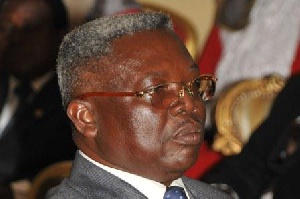If you were in any doubt about recklessness with which the finances of this country are being managed then you should now be convinced that it is true; Ghana’s Public Treasury is a victim of ‘mass rape and defilement’ on a regular basis by the very people appointed to protect it.
Last week, Justice Appau- the Judgment Debt Sole Commissioner almost broke down in tears when the reality of Ghana’s mess finally hit him like a rocket during one of the Commission’s sittings.
Since the beginning of the fifth Parliament of the fourth Republic, there has been an avalanche of what is now infamously called judgment debt payments in the country. These are supposed to be payments made as a result of judgments that were obtained by individuals or companies that suffered some administrative or contractual injustice in the hands of the state.
As most Ghanaians now know, these judgment debt payments appear to be a ‘new industry’ in which state officials collude with individuals or companies to lodge complaints in Ghana’s courts or even international courts against the state for some so called breach of contract.
Under this arrangement, state officials that are actually employed to defend the country in these matters either refuse to attend the court proceedings, so default judgments are given to the complainants or they recommend to Government not to contest the cases, but rather negotiate financial settlements.
When the deals are complete and the payments are made, these same state officials use the media to justify the payments and even sometimes try to politicize them thus attracting support from their political adherents.
A case in point is the “Woyome, Waterville and Isofoton” cases where the state lost nearly US$200 million from default judgments and or negotiated settlements. Some State Attorneys who were supposed to defend the state decided that the State did not have a case and defended the payments.
Subsequently, an Attorney General thought differently and filed an appeal against the matter and got judgments. The Court ordered the State to retrieve the monies that were paid to Waterville and Isofoton, but as you read this article the retrieval is yet to be done. The Attorney General who filed the appeal was later sacked from the Cabinet.
Honorable Justice Dotse, a Supreme Court Judge, presiding over one of such so-called judgment debt cases concluded that some state officials had turned the Judgment debt conundrum in an industry of “Create, Loot and Share”.
And only last week the Sole Commissioner for Judgment Debt, Justice Appau said “it appears we do not care about what happens to our public funds. When you think about all these things you develop headache.”
At that sitting, Justice Appau ordered the Ministry of Finance and Economic Planning to always make double checks from Ministries, Departments and Agencies to ascertain the truth before effecting payment of judgement debts on their behalf.
The Sole Commissioner, Justice Yaw Appau, said the practice where payment of judgment debts were effected by directives from the Attorney General without the Finance Ministry cross checking from Ministries, Departments and Agencies had contributed to leakages and wastage in public finances.
He said public finances were leaking every year while important projects suffer from inadequate finances due to the negligence of some authorities at the Ministry to cross check judgment debt payments.
Mr Justice Appau expressed shock at the Ministry of Employment and Labour Relation’s indebtedness of GHc16 million to the African Automobile on maintenance and workshop services of vehicles belonging to the Ministry in 2010, and rose to GHc511 million in July 2013.
According to him, the GHc511 million will scale up to GHc600 million at the end of September 2013, if payment was not made.
The Commissioner raised these concerns when the Department of Urban Roads, Judicial Service, Ministry of Environment, Science & Technology, Ministry of Finance & Economic Planning and Ministry of Manpower & Labour Relations appeared before the Commission in respect of payment of judgment debts made to African Automobile Limited on servicing and maintenance of vehicles
Mr. Justice Appau also expressed his dissatisfaction at the Attorney General for not putting up any defence to find out whether MDAs were actually indebted to the African Automobile Limited before ordering the Ministry of Finance to effect payment.
“This is the consistency we are experiencing in the payment of judgment debts. The Finance Ministry does not cross check the legitimacy of the debts and nobody from the Attorney General goes to the courts to defend such cases.”
“It appears we do not care about what happens to our public funds. When you think about all these things, you develop headache," Mr. Justice Appau said.
Mr. Justice Appau asked the Ministry of Finance to take concrete measures to curtail wastage in the public finances now and forever, by always writing to MDAs to ascertain the truth about their indebtedness before making any payments.
Kwadwo Awuah Peasah, Director of External Resources Mobilization, Bilateral Division of the Ministry, appeared before the Commission in respect of judgment debt payment made on behalf of 19 Ministries, Departments and Agencies (MDAs) to African Automobile Limited.
All the five MDAs told the Commission that they never established any agreement with African Automobile Limited in respect of the maintenance and services of their vehicles, and could not cite any document on such agreement on their records.
Mr. Peasah said the Ministry received two letters from the Attorney General directing it to pay more than GHc8 million as judgment debt to African Automobile Limited on behalf of the 19 MDAs.
He said the Ministry also paid GHc22,193 .06 in 2009 to African Automobile Limited, but expressed doubts about the Ministry purchasing vehicles for the MDAs, saying “All MDAs have their budgets for the purchase of vehicles and apply to the Ministry to release funds to purchase the vehicles.”
According to him, the MDAs will not know whether payment had been made or not because sometimes the Ministry is provided with account numbers to make direct payment.
On maintenance and services, he said, the MDAs should be better placed to answer “these questions because they are provided with funds to handle administrative expenses and therefore payment of vehicles maintenance and services are not done by the Finance Ministry.”
General News of Monday, 30 September 2013
Source: The Scandal













